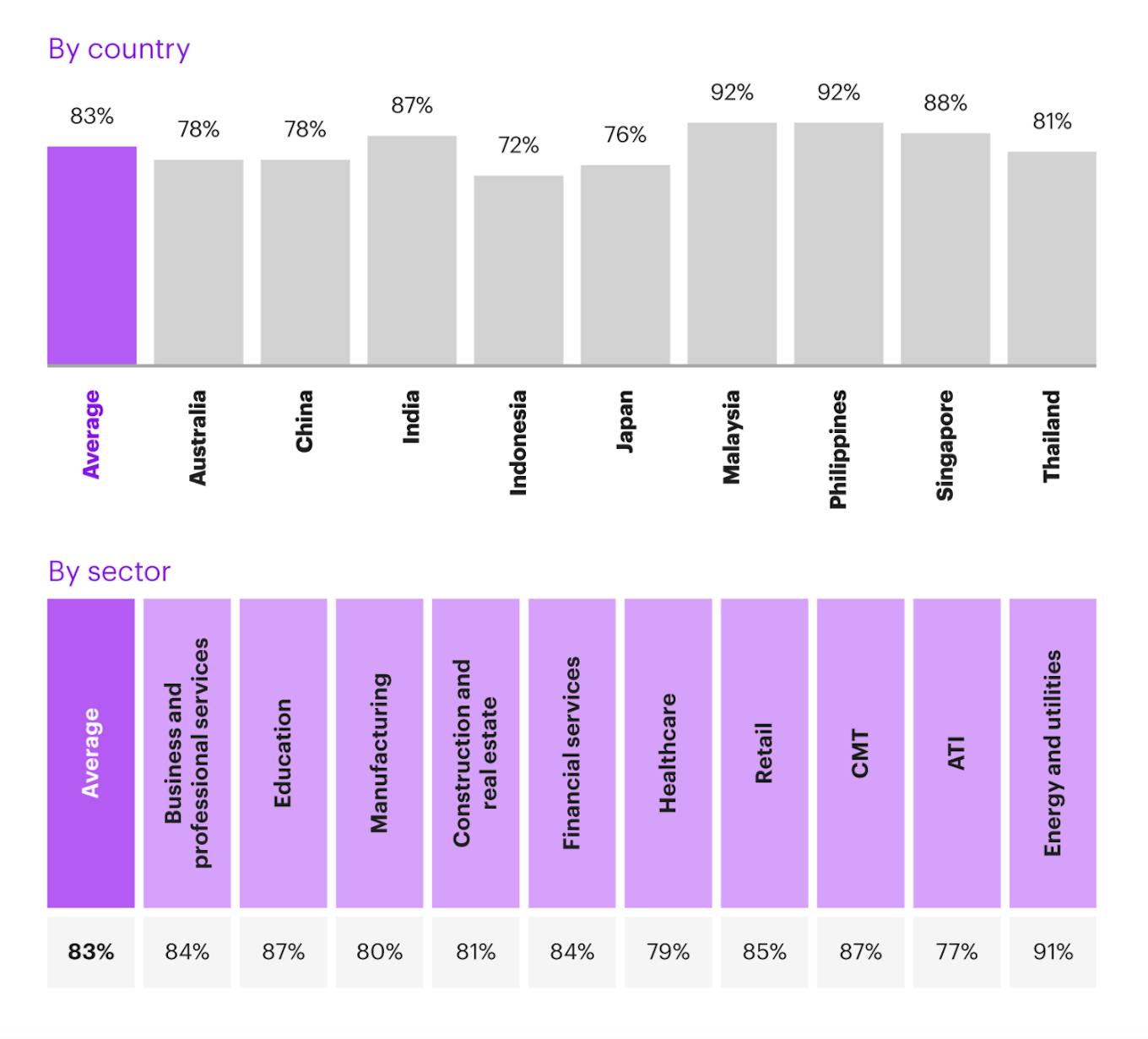A fear of greenwashing is having a complex effect on the psychology of business executives in Asia Pacific, both pushing companies to improve their sustainability programmes but also retreat into their shells when setting and communicating climate goals, a phenomenon known as greenhushing.
More than eight in 10 (82 per cent) executives in Asia Pacific are concerned about greenwashing, with executives in the Philippines and Malaysia the most worried (92 per cent), and in Indonesia, the least (72 per cent), according to a study of 1,000 executives in nine territories by management consulting firm Kearney.
The study finds that greenwashing fear has made more than eight in 10 (84 per cent) companies more cautious in their sustainability planning and target-setting and 74 per cent more hesitant to discuss sustainability plans publicly.

Percentage of executives in key Asian territories who say they are concerned about greenwashing. [Click to enlarge]. Source: Kearney
Seven in 10 (72 per cent) of executives say greenwashing anxiety has made their company more reluctant to communicate emissions reduction plans publicly – a finding reflected in the growing number of APAC companies whose climate targets have been removed by the Science Based Targets initiative (SBTi), a standard that aligns corporation decarbonisation targets with the Paris climate accord.
Greenwashing fear is partly being driven by tightening rules for how companies should communicate their environmental, social and governance (ESG) credentials to investors and consumers, the report’s authors say.
Regulators have started to turn the screw on sustainability overclaims in advertising in recent months, while jurisdictions from Malaysia to Australia have set a higher bar for sustainability disclosure this year, with the introduction of mandatory reporting against the International Sustainability Standards Board (ISSB) standards.
Carolina Rodriguez, a former United Nations executive who leads sustainability-focused creative agency Dilucidar in Singapore, said that regulation is changing so fast that it’s hard for companies to keep up. “Some don’t know where they stand,” said Rodriguez, who described regulation as a “hot potato” that is driving greenwashing concern.
Reporting on sustainability is still a relatively new concept for companies that feel they lack a “safe space” to be transparent about flaws in their programmes and communicate these gaps with confidence, which fuels greenwashing angst, she said.
“The alternative is to say nothing, because it’s safer,” she said.
Multinationals headquartered in the West with regional offices in Asia are more exposed to greenwashing scrutiny and a more aggressive activist scene, and some of that fear has been “exported” to Asia, Rodriguez suggested.
There could also be a cultural element to greenhushing, with corporates in Asia less inclined to hype their sustainability programmes than Western firms, she said.
The positive impact of scrutiny
Fears surrounding greenwash might also be having a positive impact on corporate sustainability progress in Asia. Eighty-six per cent of executives say that worrying about greenwash backlash has motivated their firm to invest more in resources and capabilities to deliver on commitments.
Nine in 10 executives believe that concerns about greenwashing has motivated their businesses to be more conscious of supplier and partner arrangements; 88 per cent say that this trepidation has prompted them to tighten their sustainability policies and processes.
Executives in the energy sector are by far the most worried about greenwashing, a reflection of the growing scrutiny the industry has come under for exaggerating the progress it is making to decarbonise in line with global climate goals.
Rodriguez said that if companies were braver in how they communicated where they are falling short in meeting sustainability targets, greenwashing would no longer be an issue.
Firms will always face accusations that they are not doing enough, but they still need to be having honest conversations about the challenges they face, she said. “Companies should be able to say: this is what we’ve discovered. It’s not pretty, but we are going to try to fix it.”
But despite growing scrutiny of corporate sustainability goals, most executives in Asia remain bullish about achieving their targets, Kearney’s study finds. Three-quarters anticipate attaining net zero in their Scope 1 and 2 emissions by 2030, while 64 per cent aim to achieve net zero for Scope 3 emissions by the end of the decade.
However, less than one-third of respondents said their companies’ decarbonisation plans were aligned with the Paris Agreement, which aims to limit planetary warming to safe levels.
Also concerning is that more than one-fifth of executives are unaware of their own employer’s decarbonisation targets.
Low internal awareness of decarbonisation goals could contribute to “confusion and inconsistencies” when defining net zero targets, leading companies to underestimate the scope of the change needed to mitigate their carbon footprint, the report warned.
Rodriguez commented that companies need to invest in “how they tell their sustainability story to themselves”, so that employees are aware of where the gaps are and where greenwashing risks might lie.
“The scary thing about net zero is that companies are setting targets with no real plan in how to meet them. It’s like mislabelling [a type of greenwashing],” she said.
Almost three-quarters (72 per cent) of Asian executives continue to view sustainability efforts as a cost to business rather than a value creating opportunity, a sentiment that is particularly strong in India (78 per cent), Australia and Indonesia (77 per cent), the study found.

















